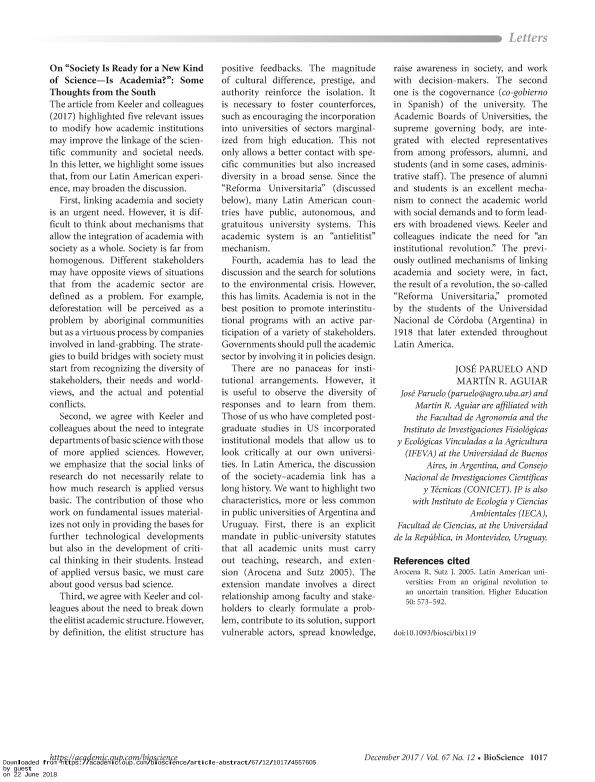Mostrar el registro sencillo del ítem
dc.contributor.author
Paruelo, José

dc.contributor.author
Aguiar, Martin Roberto

dc.date.available
2018-12-11T19:18:49Z
dc.date.issued
2017-12
dc.identifier.citation
Paruelo, José; Aguiar, Martin Roberto; On “Society Is Ready for a New Kind of Science—Is Academia?”: Some Thoughts from the South; American Institute of Biological Sciences; Bioscience; 67; 12; 12-2017; 1017-1017
dc.identifier.issn
0006-3568
dc.identifier.uri
http://hdl.handle.net/11336/66269
dc.description.abstract
The article from Keeler and colleagues (2017) highlighted five relevant issues to modify how academic institutions may improve the linkage of the scientific community and societal needs. In this letter, we highlight some issues that, from our Latin American experience, may broaden the discussion.First, linking academia and society is an urgent need. However, it is difficult to think about mechanisms that allow the integration of academia with society as a whole. Society is far from homogenous. Different stakeholders may have opposite views of situations that from the academic sector are defined as a problem. For example, deforestation will be perceived as a problem by aboriginal communities but as a virtuous process by companies involved in land-grabbing. The strategies to build bridges with society must start from recognizing the diversity of stakeholders, their needs and worldviews, and the actual and potential conflicts.Second, we agree with Keeler and colleagues about the need to integrate departments of basic science with those of more applied sciences. However, we emphasize that the social links of research do not necessarily relate to how much research is applied versus basic. The contribution of those who work on fundamental issues materializes not only in providing the bases for further technological developments but also in the development of critical thinking in their students. Instead of applied versus basic, we must care about good versus bad science.Third, we agree with Keeler and colleagues about the need to break down the elitist academic structure. However, by definition, the elitist structure has positive feedbacks. The magnitude of cultural difference, prestige, and authority reinforce the isolation. It is necessary to foster counterforces, such as encouraging the incorporation into universities of sectors marginalized from high education. This not only allows a better contact with specific communities but also increased diversity in a broad sense. Since the ?Reforma Universitaria? (discussed below), many Latin American countries have public, autonomous, and gratuitous university systems. This academic system is an ?antielitist? mechanism.Fourth, academia has to lead the discussion and the search for solutions to the environmental crisis. However, this has limits. Academia is not in the best position to promote interinstitutional programs with an active participation of a variety of stakeholders. Governments should pull the academic sector by involving it in policies design.There are no panaceas for institutional arrangements. However, it is useful to observe the diversity of responses and to learn from them. Those of us who have completed postgraduate studies in US incorporated institutional models that allow us to look critically at our own universities. In Latin America, the discussion of the society?academia link has a long history. We want to highlight two characteristics, more or less common in public universities of Argentina and Uruguay. First, there is an explicit mandate in public-university statutes that all academic units must carry out teaching, research, and extension (Arocena and Sutz 2005). The extension mandate involves a direct relationship among faculty and stakeholders to clearly formulate a problem, contribute to its solution, support vulnerable actors, spread knowledge, raise awareness in society, and work with decision-makers. The second one is the cogovernance (co-gobierno in Spanish) of the university. The Academic Boards of Universities, the supreme governing body, are integrated with elected representatives from among professors, alumni, and students (and in some cases, administrative staff). The presence of alumni and students is an excellent mechanism to connect the academic world with social demands and to form leaders with broadened views. Keeler and colleagues indicate the need for ?an institutional revolution.? The previously outlined mechanisms of linking academia and society were, in fact, the result of a revolution, the so-called ?Reforma Universitaria,? promoted by the students of the Universidad Nacional de Córdoba (Argentina) in 1918 that later extended throughout Latin America.
dc.format
application/pdf
dc.language.iso
eng
dc.publisher
American Institute of Biological Sciences

dc.rights
info:eu-repo/semantics/openAccess
dc.rights.uri
https://creativecommons.org/licenses/by-nc-sa/2.5/ar/
dc.subject
Academia And Society
dc.subject
Latin American
dc.subject
Reforma Universitaria
dc.subject.classification
Agricultura

dc.subject.classification
Agricultura, Silvicultura y Pesca

dc.subject.classification
CIENCIAS AGRÍCOLAS

dc.title
On “Society Is Ready for a New Kind of Science—Is Academia?”: Some Thoughts from the South
dc.type
info:eu-repo/semantics/article
dc.type
info:ar-repo/semantics/artículo
dc.type
info:eu-repo/semantics/publishedVersion
dc.date.updated
2018-10-23T19:53:15Z
dc.journal.volume
67
dc.journal.number
12
dc.journal.pagination
1017-1017
dc.journal.pais
Estados Unidos

dc.journal.ciudad
Washington
dc.description.fil
Fil: Paruelo, José. Consejo Nacional de Investigaciones Científicas y Técnicas. Oficina de Coordinación Administrativa Parque Centenario. Instituto de Investigaciones Fisiológicas y Ecológicas Vinculadas a la Agricultura. Universidad de Buenos Aires. Facultad de Agronomía; Argentina. Universidad de la República; Uruguay
dc.description.fil
Fil: Aguiar, Martin Roberto. Consejo Nacional de Investigaciones Científicas y Técnicas. Oficina de Coordinación Administrativa Parque Centenario. Instituto de Investigaciones Fisiológicas y Ecológicas Vinculadas a la Agricultura. Universidad de Buenos Aires. Facultad de Agronomía; Argentina
dc.journal.title
Bioscience

dc.relation.alternativeid
info:eu-repo/semantics/altIdentifier/doi/https://dx.doi.org/10.1093/biosci/bix119
dc.relation.alternativeid
info:eu-repo/semantics/altIdentifier/url/https://academic.oup.com/bioscience/article/67/12/1017/4557605
Archivos asociados
